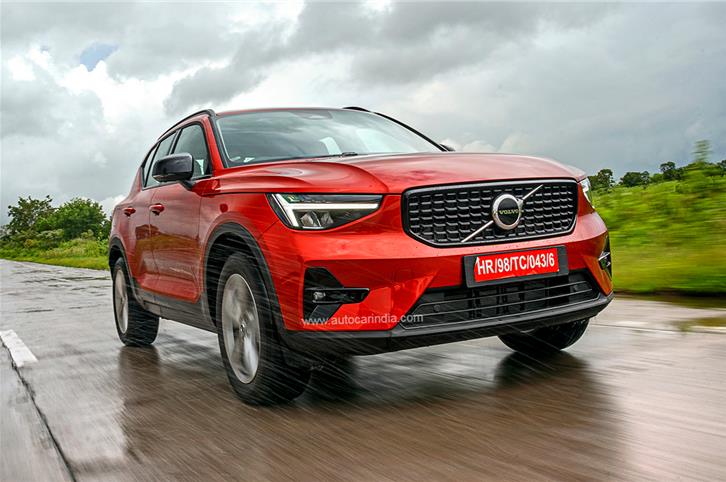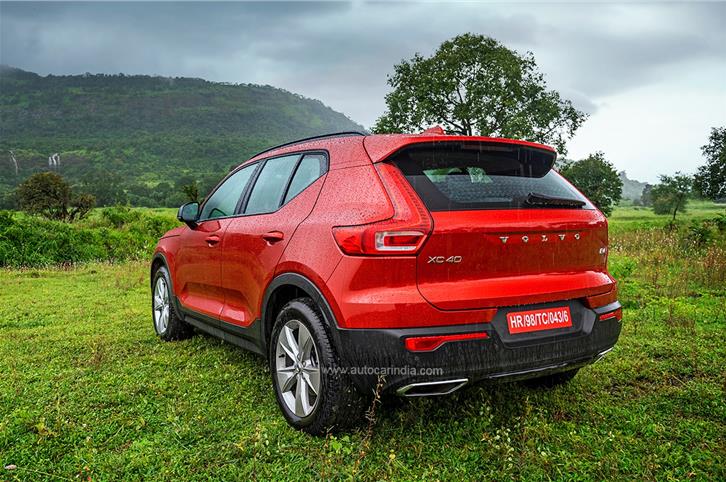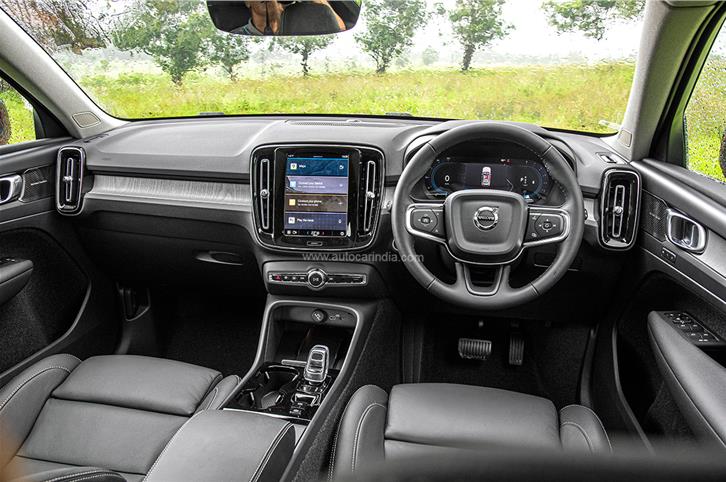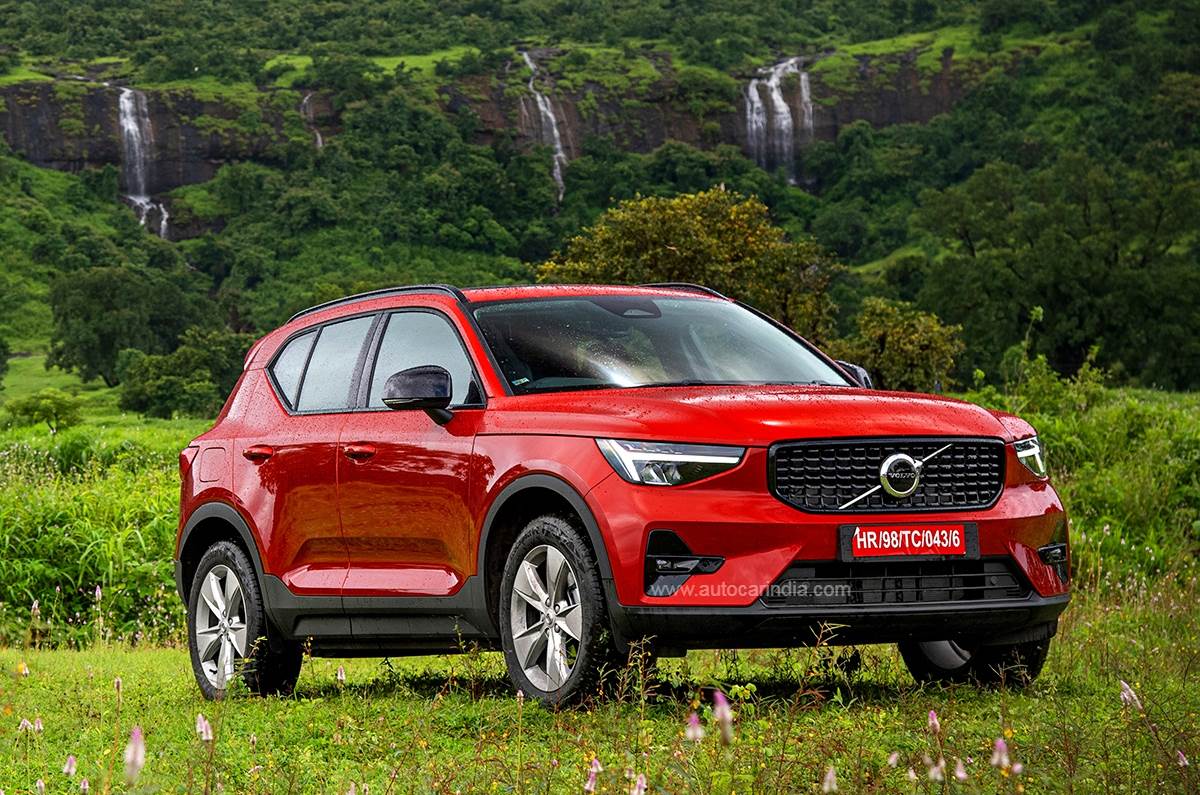Volvo's entry-level offering in India gets a shot in the arm, albeit an incremental one. We tell you what it's like.
Published on Sep 21, 2022 01:00:00 PM
18,755 Views
Follow us on
New headlights and bumper make the XC40 appear sharper.

Black skid plate and new B4 badge are the only points of distinction at the rear.

Changes to the cabin include a new wooden inlay on the dashboa5rd.
Volvo has just launched the XC40 facelift in India at Rs 43.20 lakh (limited period). This mid-lifecycle update has brought in a new mild-hybrid powertrain and updated styling, among other changes. We take it out for a spin and tell you what the Volvo XC40 facelift is like.
Volvo has given the XC40 sharper styling this time around, with more angular headlights that retain the signature ‘Thor’s hammer’ LED Daytime Running Lights, and a new bumper with triangular fog lamp housings that’s finished in gloss black. The rest of the elements remain unchanged up front, so it continues to get a big, gloss black grille with the Volvo logo in chrome and the clamshell bonnet design.

Along the side, the XC40 facelift has gained a new design for the alloy wheels. However, the five-spoke silver-coloured alloys look quite plain in comparison to the pre-facelift car’s dual-tone diamond-cut design. Volvo has also chosen to leave out the dual-tone paint scheme, with the roof now being body coloured. Interestingly though, the XC40 facelift does get black wing mirrors and roof rails.
.jpg&c=0)
Changes to the rear are very minimal and will take a keen eye to notice them. Gone is the T4 badge from the tailgate and in comes the new B4 badge, signifying its powertrain. The other minor change is that the rear skid plate is now finished in black, in place of the silver on the older model.
Overall, this can be classified as a subtle update instead of a full-blown facelift. While the sharper design keeps it updated with newer rivals, we can’t help but think that the outgoing, sporty R-Design variant looked much better as an overall package.
Much like the exterior, the interior of the XC40 only gets minor changes. The cabin has a minimalist design and is made up of high quality materials, like you’d expect from a Volvo. The XC40 facelift gets new, open-pore wood inlay on the dashboard and door cards, which help uplift the ambience and gloss black detailing around the AC vents, touchscreen, and the centre console looks neat. The car we’ve tested came with an all-black interior theme, but buyers can also opt for a beige theme.

The chunky, leather-wrapped steering wheel is unchanged from the outgoing model, which is no bad thing, but surprisingly, it does miss out on paddle shifters. Meanwhile, the 9-inch portrait-oriented touchscreen now uses an Android-based system and gets integrated Google services. The infotainment system is slick in its operation, but it can get confusing and takes some time to figure out.
.jpg&c=0)
Furthermore, the HVAC controls are still located in the touchscreen, and while it is easy to find, it just isn’t as convenient as physical buttons. Volvo has also taken the opportunity to update the graphics of the 12.3-inch digital instrument cluster, and the only other notable change on the inside is the new crystal gear lever.
The front seats are excellent in terms of support and cushioning and offer loads of electric adjustability. The driver’s seat also gets a memory function, but heated and ventilated seats are missing, which would have been nice.
.jpg&c=0)
At the rear, there’s good amount of room on offer and the seats are comfy too, but the backrest is a bit too upright. The all-black theme can also make you feel hemmed in, but the large panoramic sunroof does a great deal to alleviate that. Furthermore, the XC40’s boot gets a flat floor and can easily swallow up luggage for a weekend getaway trip.
.jpg&c=0)
As for features, the XC40 facelift gets a PM 2.5 air purifier, leather upholstery, a powered tailgate, LED lighting, connected car tech, Apple CarPlay, a 14-speaker, 600W Harman Kardon audio system, wireless charging and a tyre pressure monitoring system.
Being a Volvo, the XC40 facelift gets a wide range of safety equipment including some ADAS features. The equipment list includes 7 airbags, front and rear parking sensors, rear camera, adaptive cruise control, collision mitigation support, lane keep assist, blind spot monitor, hill-start assist and hill-descent control. While the XC40’s ADAS features work well, there's only limited places where you can use them.
Perhaps the biggest change on the Volvo XC40 has taken place under the hood. The engine is the same 2.0-litre, four-cylinder T4 turbo-petrol unit that did duty on the outgoing model, but on this facelift it has gained a 48V mild-hybrid system, which does impact the driving experience. At idle, the four-pot motor remains a refined unit, with barely any sound or vibrations filtering into the cabin.
.jpg&c=0)
In terms of output, the engine has only gained 7hp (197hp), while the torque remains the same as before at 300Nm. However, this B4 mild-hybrid does feel more responsive than the outgoing T4 version. You can feel the hybrid system assisting while accelerating and it has also helped improve response off the line. The engine pulls cleanly all the way to the redline and is quite linear too in its delivery.
Apart from improving the performance, the mild-hybrid system is also expected to improve the fuel efficiency of the XC40. However, Volvo is yet to reveal an official figure and we're yet to test it on out fuel efficiency cycle.
.jpg&c=0)
The power is transmitted to the front wheels only through an 8-speed torque converter automatic gearbox. While the gearbox is seamless enough in its operation, it isn’t the quickest to respond. However, the responsive engine does help mask some of the box’s shortcomings. There’s a manual mode for the gearbox too, operated via the crystal gear lever, but it doesn’t feel very engaging.
In terms of the ride, the XC40 facelift impresses with its stability at high speeds, but the ride does feel a bit firm at low speeds over broken patches of roads. But it is never uncomfortable as the jolts rarely filter through inside and the cabin is well insulated from the outside world.
.jpg&c=0)
The XC40 facelift is no BMW X1 when it comes to handling, but it does feel confident in the bends. Body roll is well contained, the steering feels consistent and there’s a good amount of grip on offer too. There are also two modes for the steering, and while they help increase the weight, they don’t add much in terms of feedback.
The Volvo XC40 facelift is available in a single, fully-loaded variant that's priced at Rs 43.20 lakh (introductory, ex-showroom, India). And while it will be hiked to Rs 45.90 lakh (Rs 1.40 lakh more than the outgoing XC40 T4) after the introductory period, its price will be on par with competitors like the Mercedes-Benz GLA 200 (Rs 44.90 lakh) and the recently introduced Audi Q3 Premium Plus (Rs 44.89 lakh).
Where it lags though is rear seat comfort and its service network isn't as widespread as its German competitors. Beyond that, the Volvo XC40 remains a good looking SUV with safe and predictable road manners and the incremental changes brought by the facelift only add to an already impressive package. Furthermore, the mild-hybrid system makes it even more driveable and will aid efficiency as well.
Thus, in conclusion, if you are on the lookout for a comfortable, well-equipped luxury crossover, this one is definitely worth looking at.
Also see:
2022 Volvo XC40 facelift video review
Copyright (c) Autocar India. All rights reserved.

Maruti Suzuki plans to use the Boosterjet engine in more models. Which one would you like to see it in?
Comments
Member Login
Personal Details
No comments yet. Be the first to comment.